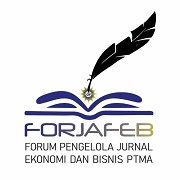Membangun Compound Brand Image dan Media Sosial dalam Mempengaruhi Keputusan Mahasiswa Memilih Universitas Muhammadiyah Aceh
Abstract
The purpose of this research is to examine the effect of compound brand image and social media to students decision (case study on University o Muhammadiyah Aceh students). This study applies causality-explanatory approach, with primary data in thr form of 217 students perception as individual research object. The method of data collection is survey using questionaire. To analyze the data is used Partial Least Square with second order. The result indicate that compound brand image and social media have significant effect to student decision choosing Universitas Muhammadiyah Aceh. Compound brand image has a greater effect than social media, in influencing students decision to choose Universitas Muhammadiyah Aceh.
Keywords
Full Text:
PDFReferences
Aaker, D. A. (2011). Brand Rellevance, Making Competitors Irrelevant. Jossey.Bass, A Willey Imprint.
Al-motairi, M. a, Al-meshal, S. a, & Arabia, R. S. (2013). The Mediating effect of Customer Involvement and Brand Image on e-CRM Implementation and Brand adaption : An Empirical Study in Franchising System. The Journal of American Business Review Cambridge, 2(6), 315–325.
Da Silva, R. V., & Syed Alwi, S. F. (2008). Online corporate brand image, satisfaction and loyalty. Journal of Brand Management, 16(3), 119–144. https://doi.org/10.1057/palgrave.bm.2550137
E.Anderson, J. F. H. C. B. B. J. B. R. (2010). Multivariate Data Analysis: A Global Perspective.
Erlinda, E., Suryana, Y., Afiff, F., & Helmi, A. (2016). The Influence Of Franchisor’s Brand Image On Franchisee Trust And Its Impact On Franchisee Intention To Remain In Franchise System. International Journal of Scientific & Technology Research, 05(02), 164–168. https://www.ijstr.org
Hawabhay, B. B., Abratt, R., & Peters, M. (2009). The role of corporate communications in developing a corporate brand image and reputation in mauritius. Corporate Reputation Review, 12(1), 3–20. https://doi.org/10.1057 /crr.2009.4
Henderson, I. L., Avis, M., Tsui, W. H. K., Ngo, T., & Gilbey, A. (2023). Compound Brands and the Multi-Creation of Brand Associations: Evidence from Airports and Shopping Malls. Sustainability, 15(2), 1450. https://doi.org/ 10.3390/ su1 5021450
Iversen, N. M., & Hem, L. E. (2008). Provenance associations as core values of place umbrella brands. European Journal of Marketing, 42, 603–626. https:// explore.openaire.eu/search/publication?articleId=doi_________::ccfc9e49dd7d56d791b022b8886cc6a1
Keller, K. L. (2021). The Future of Brands and Branding: An Essay on Multiplicity, Heterogeneity, and Integration. Journal of Consumer Research, 48(4), 527–540. https://doi.org/10.1093/jcr/ucab063
Khatib, F. (2016). The Impact of Social Media Characteristics on Purchase Decision Empirical Study of Saudi Customers in Aseer Region. Arab Saudi: International Journal of Business and Social Science. International Journal of Business and Social Science, 7(4), 41–50. http://ijbssnet.com/view.php?u=http://ijbssnet.com/journals/Vol_7_No_4_April_2016/4.pdf
Kotler, P., & Keller, K. L. (2016). Marketing Management (P. E. Limited (ed.); 15e ed.). Pearson.
Mondal, P., & Mehra, P. (2022). Social Media Platforms and Customer Engagement. Special Education 2022, 1(43), 4179–4192. https://www.sumc.lt/index.php/se/article/view/492
Mourad, M., Ennew, C., & Kortam, W. (2011). Brand equity in higher education. Marketing Intelligence & Planning, 29(4), 403–420. https://doi.org/ 10.1108/ 02634501111138563
Nandan, S. (2005). An exploration of the brand identity–brand image linkage: A communications perspective. Journal of Brand Management, 12(4), 264–278. https://doi.org/10.1057/palgrave.bm.2540222
Tian, Z., & Lu, M. (2022). Consumer Innovativeness and Consumer Engagement: User Motivation As a Mediator. Social Behavior and Personality: An International Journal, 50(6), 1–11. https://doi.org
/10.2224/sbp.11341
Xing, Y., Liu, Y., Boojihawon, D. K., & Tarba, S. (2020). Entrepreneurial team and strategic agility: A conceptual framework and research agenda. Human Resource Management Review, 30(1), 100696. https://doi.org/10.1016/ j.hrmr. 2019.100696
DOI: https://doi.org/10.32502/jimn.v13i2.7205
Refbacks
- There are currently no refbacks.

Jurnal Ilmu Manajemen is published by Pascasarjana Management Department. This work is licensed under a Creative Commons Attribution-ShareAlike 4.0 International License.
INDEXED / ABSTRACTED




.png)



1.png)













